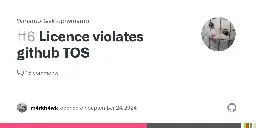WinampDesktop/winamp - Licence violates github TOS · Issue #6
WinampDesktop/winamp - Licence violates github TOS · Issue #6

No Distribution of Modified Versions: You may not distribute modified versions of the software, whether in source or binary form. * No Forking: You may not create, maintain, or distribute a forked ...

